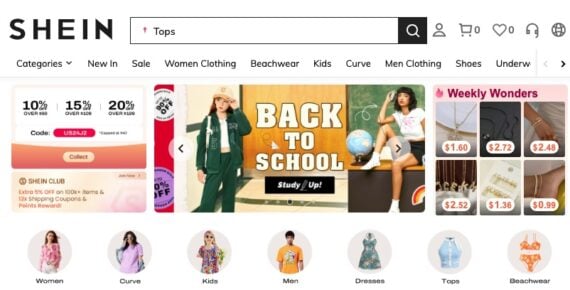We asked industry experts to comment on Amazon’s plan to create a new category for Chinese sellers to ship directly to US consumers. The move is an apparent effort to win back customers who have turned to Temu and Schein, manufacturers of cheap goods and clothing, respectively.

China-based Shein sells affordable “fast fashion” clothing.
A Bad Idea
That’s a bad idea, according to Phil Masiello, CEO of CrunchGrowth Revenue Acceleration Agency and longtime Amazon seller and founder of multiple ecommerce companies.
Sellers and manufacturers have been fighting with Amazon against cheap fakes from China for years. “It’s going to upset existing brands,” Masiello said in a video interview, adding, “Amazon needs to go higher. They need to adapt and try to be Temu.”
China’s competition is selling “useless things to the uneducated. They buy it once. They are not Temu’s long-term customers,” Masiello said. Temu is popular, he says, but the business model is unsustainable.
“Amazon has one thing that any brand would love, and that’s savings,” Masiello added. “Everybody has an Amazon app on their phone. It’s the first place we look for something.”
Masiello believes the move will cost Amazon, where quality retailers face increasing fees — about 50% of sales go to Amazon.
Masiello is not alone in his opinion that Amazon is making a mistake.
The Competition Is Inviting
Rick Wilson, chief executive of ecommerce firm Miva, said: “Amazon has dealt with the devil by allowing this fraud to come from overseas. They have invited competition.”
High-end products will be protected in the new store, but “ultimately it depends on the item.”
“Amazon continues to aggressively pursue overseas manufacturers and make it easier for them to become consumer products themselves,” said James Thomson, managing partner at Equity Value Advisors and managing director. former Amazon. “In many categories, US-based brands on Amazon are looking for things overseas and now they’re competing with their manufacturers. Amazon is helping them.”
“The more Amazon goes after cheaper options, the harder it is for small U.S. brands to do well,” Thomson said.
However, Thomson doesn’t see much of a problem for good sellers at high prices.
“A lot of things at Temu and Schein are impulse buys,” Thomson said. “I don’t go to these sites thinking this is what I need to fill my home.”
Thrasio, an ecommerce aggregator that recently emerged from bankruptcy, is focusing on quality and reliability to avoid competition with Temu and Schein’s products.
Purchased items, such as kitchen appliances, will be cheaper for customers with direct-from-China offerings.

By focusing on quality, Thrasio hopes to avoid competing with cheaper alternatives.
“There’s no way to compete with some of those commodity products,” Stephanie Fox, Thrasio’s new CEO, said in an interview. “Your margins will be 5%, which won’t support a high-end business. Can other entrepreneurs compete with those products? Sure, but they won’t make a lot of money doing it.”
“Competing with low-quality products, which is what Amazon is focused on, is not going to be good,” Fox said.
Mark Daoust, founder of Quiet Light, an ecommerce business, compared the move to Amazon Basics.
“I’ve seen business killed by Amazon Basics,” Daoust said, citing one customer who was selling low-cost office chairs. “Many retailers want to create a brand, a high-quality product, and focus on uniqueness that no one else can imitate. The client was making affordable chairs available to the masses. That was a total value proposition. ”
It wasn’t necessarily the best chair on the market, but it was great value and very functional – until it wasn’t. “Amazon Basics ruined that company.”
#Amazons #Direct #China #Policy #Criticized